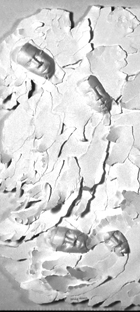
for everything you never thought to ask

| Home |
| God |
|
Names of God Concepts of God Theories of God Theism Atheism |
| Religion |
| Prayer |
| Spirit |
| Saints |
| Angels |
| Reality |

Why God: this section is for atheistsWhy, if there is no God or spiritual dimension, would there be an evolutionary bias toward this belief?There is this popular idea that the belief in God is a progressively evolved human concept which developed out of prehistoric anthropomorphic conceptualizations of natural forces as spirits, and gods. These beliefs then gradually took on greater complexity over millennia until it finally all morphed into belief in a single God. And the culmination of this process has been the realization that there are really just natural forces and no God, no spirit, no non-physical dimension of the universe. The first problem with this idea is that atheism is not a modern conception. There has, in fact, been a certain proportion of human communities which have–since as far back as we have recorded philosophical ideas–believed firmly in the non-existence of divine or spiritual beings. From ancient Greek and Hindu philosophers to Buddhist, Jain and Tao sages, there has been a continual and ongoing counterpoint of non-theism in human thought along with the dominant theist views. Another difficulty is the presumption that evolution of our humanity has been driven only by responses to the physical environment and is measured in beneficial results conferred for physical survival of human populations. As Richard Dawkins beautifully and brilliantly showed, ideas themselves evolve with mechanisms remarkably similar to the physiological evolution of organisms. Memes, he explains, are the basic units of ideas which combine in different permutations of mental and cultural structures, evolving and surviving or collapsing into extinction in the ideosphere in the same way that genes govern the structures and functions and shape the physical evolution of organisms in the biosphere. When we speak or think of our humanity, we are not referring to our biology but to our social structures, our continually, mutually interacting cultures. We mean the universes we have created from mathematics, art, music, dance, literature and all the multiverses of the sciences. Our humanity is constructed from all these diverse strands intertwining in endlessly evolving ideospheres. Even with 400 years of strong cultural influences from the rational intellectual forms of atheism characteristic of Euro-American cultures, some form of belief in God is still the dominant cultural norm. This suggests that a belief in a God, gods, spirits, divinities, a non-physical dimension, actually, must provide a strong beneficial impetus to precisely those many roiling currents which form the mystery that is our humanity. In fact it was human conceptions of spiritual dimensions, gods, divinities, which drove the formation and evolution of human culture, abstract thought, intellectual inquiry, the building blocks of our humanity. It has been in reaching beyond ourselves, stretching our minds toward that which transcends our conscious awareness, imagining a meta-reality which encompasses all our divergent experiences and conceptions in a global awakening of universal realization, that we are ceaselessly giving birth to that which makes us most human. Even if there is no God, it is in imagining God that we achieve our most exquisite and rare human capacities for abstract thought. |


"emergence"
| Why God idea (for atheists) |
| Why no-god idea (for theists) |
| the two-way path |
| secular atheism |
| secular atheism key points |
| science and religion |
| reason and faith |
| God is... is not |
| secular atheism types |
| |
| some links may not yet have taken birth - they will awaken - please wait for them |